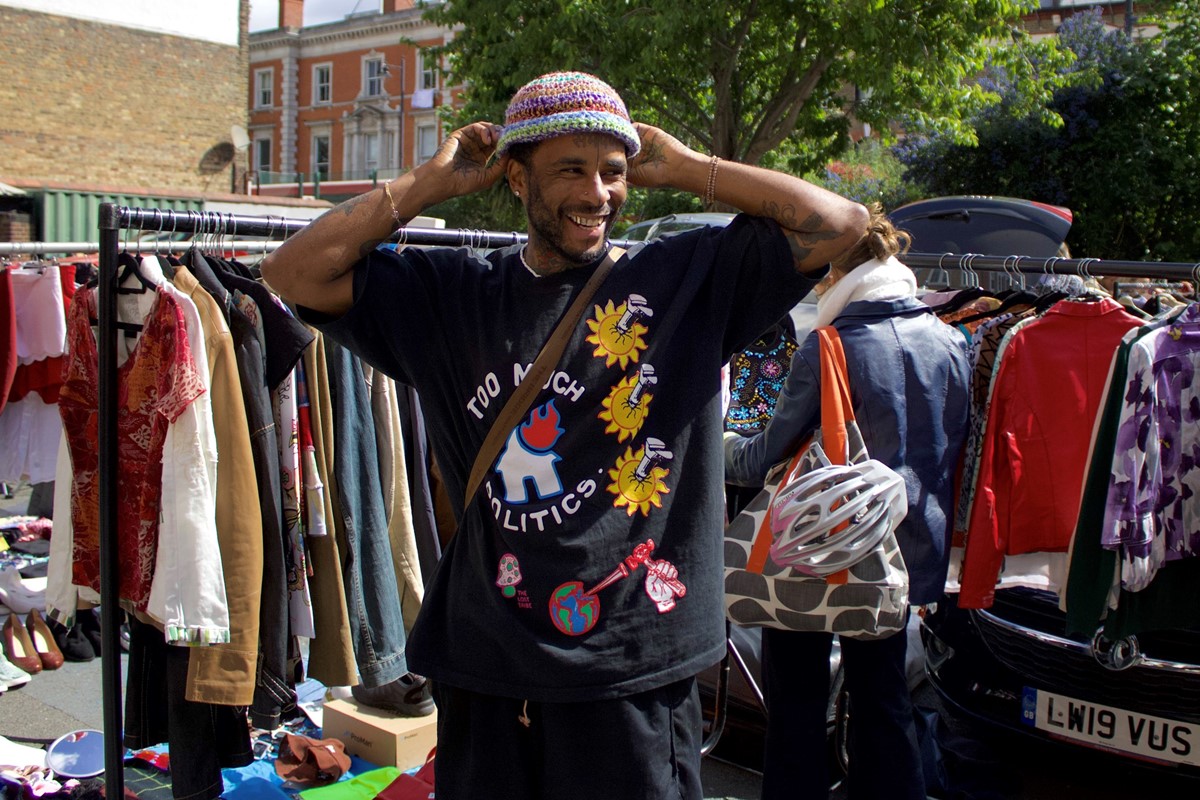London’s car boot sales14 Images
Picture the scene. It’s 5.30am, the start of the weekend, and Kingsland Road in Dalston is only just exhaling the last of Friday night’s revellers. Nightclub signs flicker off. Blinds rattle down on late-night food joints. But just around the corner, a different kind of energy is stirring. It’s Saturday, and the Princess May Car Boot sale is beginning to open its gates. By 6am, the set-up is in full swing, with traders wrangling rails of vintage denim or seventies fur coats, waving to other regulars and haggling over early-bird pitches.
For nearly two decades, this schoolyard has transformed each weekend into one of East London’s liveliest micro-communities. Car boot sales like this are no longer just about clearing out your loft; they’ve become crucial spaces for emerging designers and resellers to test, tweak and shape fashion, escaping the studios and spreadsheets for face-to-face feedback, with the very people wearing it.
“Coming here, I get crazily informed,” says Lagos-born and Glasweigan-raised Olubiyi Thomas, a designer who sells archival fashion alongside pieces from his namesake, Nigerian-inspired label. “You have everyone: youngsters, stylish people, mums, dads, uncles, kids. If I have 60 garments on the rack – all different styles, colours, shapes, materials – after a while I start to understand what people want from selling to them directly.”
Thomas’s front-and-centre patch in the car park, positioned in perfect eyeline from the entrance, lets slip a carefully thought-out strategy. He engages with each and every customer, suggesting pieces that go with their height, their hair, their style. Holding up a mirror to ensure all angles are on view, Olubiyi listens intently to their concerns as they try on different garments, rebutting where needed, and offering alternatives from the array of pre-loved goods, or his own collection of raw-hemmed, deconstructed designs.
For Olubiyi, a departure from the traditional retail system to customer-facing feedback is what makes the car boot stand out. “Usually, if I were selling to a retailer, I’d just ship off the clothes and I wouldn’t really know what happens to them, who wears them, what they look like on. Here, you can get that research in an instant. Somebody will try the skirt on and say, ‘I love this, but I don’t like the material’. Or ‘it’s too big’, or ‘I don’t like this waistband’. So from that, the next thing I buy or the next thing I make, I’ll have those details.”
The chance to spot trends ahead of the curve is what drew Abbie Jenkins, founder of Unarchived Wholesale, to the Balham car boot, held every other Sunday in southwest London. Perched with a friend on chairs brought from home, and sipping hot drinks in front of a carefully curated selection, Jenkins watches over customers who sift through items ranging from Moncler tees and unlabelled silk slips to belted miniskirts that scream Julia Fox. Pointing to shoppers as they walk by, Abbie explains how she makes a special effort to notice their unique style and outfits. “Just look at people,” she explains. “I always notice people’s outfits in depth, and then you can pick up on the trends and know what to get next. Here, the fashion is more Y2K, similar to our stock.”
Moreover, in a city like London, shoppers and sellers alike are spoiled for choice, with 14 regular car boot sales dotted around town. “I love all of them,” smiles Youth, a vintage reseller since 2016, who is a regular face at the Princess May. “Peckham’s got more high-end stuff. Dalston, you get all types. Then you leave London, and you’re paying a pound for everything – but it’s more random. I like them all for different reasons.”
Car boot sales have become living, breathing fashion labs – and they’re redefining the locus of innovation
Surrounded by leather bags sourced in Italy, and clothes rails heavy with 00s designer pieces picked up in Thailand and the UAE, Youth describes the car boot as a “circular inspiration loop”, where on-the-ground research becomes part of his creative process. “What I see people wearing informs what I might want to wear. And sometimes what I wear inspires what someone else is looking for.”
Full of energy, with the buzz from a good find palpable in the air, Youth insists that the ability to spontaneously connect with fellow fashion fans IRL is the push today’s eco-crowd needs, to get them off reselling sites and back into grassroot communities. “During Covid, we were all forced to shop online,” he recalls, as he hands over change to a happy and newly kitted-out customer. “Everything became so digitised. So I think in the aftermath, people really wanted more real-life experiences. Being able to see people, talk to people, connect. I like being able to sell directly to people, and I feel like the clothes come alive when people wear them.”
Juxtaposed against a rapidly growing online industry, patrons like Youth, Abbie and Olubiyi in unassuming school carparks are repositioning fashion as a conversation rather than a finished product. Interwoven with the chance to refine details, experiment with silhouettes, and float new designs, each sale, passing compliment or hesitation becomes vital real-time research, fine-tuned by the people who will actually wear the designs. Far from just trading sites, car boot sales have become living, breathing fashion labs – and they’re redefining the locus of innovation, one bargain at a time.
